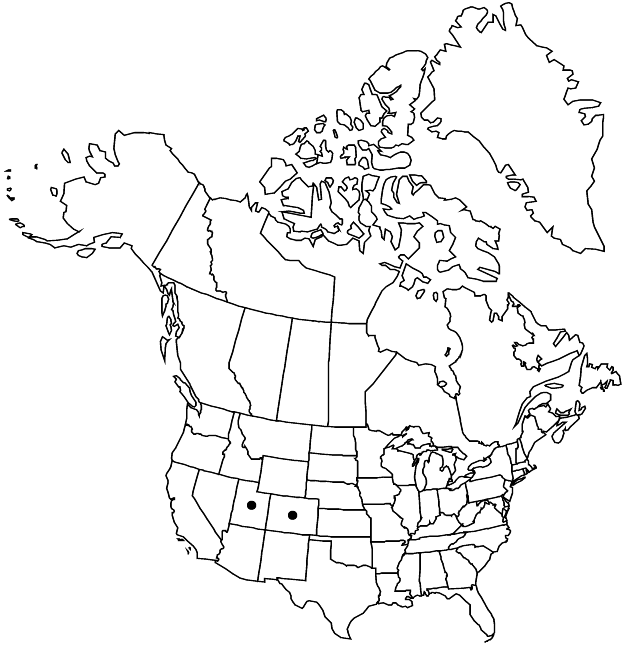Difference between revisions of "Rumex pycnanthus"
Repert. Spec. Nov. Regni Veg. 38: 372. 1935.
FNA>Volume Importer |
imported>Volume Importer |
||
| (3 intermediate revisions by 2 users not shown) | |||
| Line 6: | Line 6: | ||
|place=38: 372. 1935 | |place=38: 372. 1935 | ||
|year=1935 | |year=1935 | ||
| + | }} | ||
| + | |special_status={{Treatment/ID/Special_status | ||
| + | |code=E | ||
| + | |label=Endemic | ||
}} | }} | ||
|basionyms={{Treatment/ID/Basionym | |basionyms={{Treatment/ID/Basionym | ||
|name=Rumex subalpinus | |name=Rumex subalpinus | ||
|authority=M. E. Jones | |authority=M. E. Jones | ||
| + | |rank=species | ||
|publication_title=Proc. Calif. Acad. Sci., ser. | |publication_title=Proc. Calif. Acad. Sci., ser. | ||
|publication_place=2, 5: 720. 1895 (as subalpina), | |publication_place=2, 5: 720. 1895 (as subalpina), | ||
| Line 16: | Line 21: | ||
|name=Rumex densiflorus subsp. pycnanthus | |name=Rumex densiflorus subsp. pycnanthus | ||
|authority=(Rechinger f.) Á. Löve | |authority=(Rechinger f.) Á. Löve | ||
| + | |rank=subspecies | ||
}} | }} | ||
|hierarchy=Polygonaceae;Polygonaceae subfam. Polygonoideae;Rumex;Rumex subg. Rumex;Rumex sect. Rumex;Rumex pycnanthus | |hierarchy=Polygonaceae;Polygonaceae subfam. Polygonoideae;Rumex;Rumex subg. Rumex;Rumex sect. Rumex;Rumex pycnanthus | ||
| Line 40: | Line 46: | ||
-->{{#Taxon: | -->{{#Taxon: | ||
name=Rumex pycnanthus | name=Rumex pycnanthus | ||
| − | |||
|authority=Rechinger f. | |authority=Rechinger f. | ||
|rank=species | |rank=species | ||
| Line 54: | Line 59: | ||
|publication title=Repert. Spec. Nov. Regni Veg. | |publication title=Repert. Spec. Nov. Regni Veg. | ||
|publication year=1935 | |publication year=1935 | ||
| − | |special status= | + | |special status=Endemic |
| − | |source xml=https:// | + | |source xml=https://bitbucket.org/aafc-mbb/fna-data-curation/src/2e0870ddd59836b60bcf96646a41e87ea5a5943a/coarse_grained_fna_xml/V5/V5_1058.xml |
|subfamily=Polygonaceae subfam. Polygonoideae | |subfamily=Polygonaceae subfam. Polygonoideae | ||
|genus=Rumex | |genus=Rumex | ||
Latest revision as of 22:07, 5 November 2020
Plants perennial, glabrous or indistinctly papillose-pubescent, with fusiform or creeping horizontal rhizome. Stems erect, branched above middle (only in inflorescence), 60–100 cm. Leaves: ocreae deciduous or partially persistent at maturity; blade normally oblong-lanceolate, 20–45 × 8–10 cm, normally more than 3 times as long as wide, base broadly cuneate, truncate, or weakly cordate, margins entire, flat or indistinctly crisped, apex obtuse or broadly acute. Inflorescences terminal, occupying distal 1/2 of stem, often dense, narrowly paniculate. Pedicels articulated in proximal 1/2, occasionally almost near base, filiform, 3–11 mm, articulation indistinct or weakly evident. Flowers 10–20 in whorls; inner tepals ovate-deltoid or ovate-triangular, 4–7 × 3–5 mm, widest at or near base, base truncate or weakly emarginate, margins erose to minutely dentate at least near base, apex narrowly acute; tubercles absent. Achenes deep brown to reddish brown, 3–4 × 1.5–2.2 mm. 2n = 120.
Phenology: Flowering late spring–summer.
Habitat: Along streams and rivers in montane, subalpine, and alpine zones
Elevation: 1700-3000 m
Discussion
Rumex pycnanthus was reported (as R. subalpinus M. E. Jones) from White Pine County, Nevada (Mont E. Lewis 1973) and may occur in that state; according to J. T. Kartesz (1987, vol. 1), that record was based on misidentification of R. californicus.
Selected References
None.
